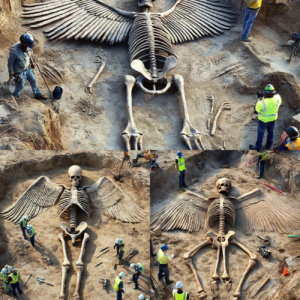In a remarkable turn of events that has captivated both the scientific community and the public, an excavation in the Egyptian desert has yielded findings that suggest extraterrestrial involvement in ancient Egyptian history. This groundbreaking discovery, made by a team led by an Egyptologist with an unconventional background, has sparked intense interest and debate.

The Discovery Revealed
The excavation, conducted in a remote desert region of Egypt, unearthed artifacts and structures that defy conventional explanations. These findings were uncovered by Dr. Adrian Xelus, an Egyptologist known for his controversial theories about extraterrestrial influence on ancient civilizations. The artifacts discovered include advanced tools and inscriptions that do not align with known ancient Egyptian technology or language.
Extraterrestrial Artifacts
Among the most striking finds are objects crafted from materials not previously documented in ancient Egyptian artifacts. These items feature intricate designs and technological components that suggest a level of advancement far beyond that of ancient human societies. The presence of these artifacts has led to speculation that they could be remnants of an extraterrestrial presence or influence.

Unusual Inscriptions
The excavation also revealed inscriptions that do not match any known Egyptian scripts. These enigmatic writings, found on stone tablets and other surfaces, include symbols and language that suggest an advanced understanding of science and technology. The content of these inscriptions has fueled theories that ancient Egyptians might have had contact with extraterrestrial beings.
The Extraterrestrial Egyptologist’s Role
Dr. Adrian Xelus, the lead Egyptologist on the team, has long been an advocate of the theory that extraterrestrials played a role in shaping ancient human civilizations. His previous work has been met with skepticism, but the recent findings have brought renewed attention to his theories. Dr. Xelus believes that these discoveries provide concrete evidence of extraterrestrial contact and influence on ancient Egypt.
Implications for Archaeology and History
The implications of these findings are profound. If the artifacts and inscriptions are indeed of extraterrestrial origin, they could challenge existing historical and archaeological paradigms. The discovery suggests that advanced beings from beyond Earth may have had a significant impact on ancient Egyptian society, potentially altering our understanding of human history and technological development.
Global Reactions
The news of this discovery has generated widespread excitement and controversy. Social media, news platforms, and scientific circles are abuzz with discussions about the potential extraterrestrial origins of the artifacts. While some are enthusiastic about the implications, others remain skeptical and call for further investigation and validation.

Ongoing Research and Future Exploration
Given the significance of these findings, ongoing research is essential to verify and understand their implications. Teams of archaeologists, historians, and experts in extraterrestrial studies are working together to analyze the artifacts and inscriptions in greater detail. Their research aims to uncover the full scope of the discoveries and determine their impact on our understanding of ancient civilizations.
Conclusion
The discovery made during excavations in the Egyptian desert, led by the extraterrestrial Egyptologist Dr. Adrian Xelus, represents a potential paradigm shift in our understanding of ancient history. As research continues, the world watches with anticipation, eager to learn more about the possible extraterrestrial connections to ancient Egypt and what these revelations may mean for our knowledge of human and extraterrestrial interactions.




